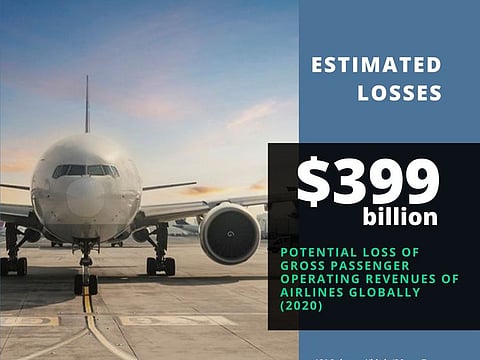Only drastic actions can stem airlines' financial pain
Need of the hour is airline consolidation and offering best options for fliers

I have no idea how airlines are going to recover from COVID-19.
Looking around, a few airlines have most recently announced running out of cash by this quarter or that. Because of COVID-19, airlines are grappling with low seat factors - the ratio of passengers to available seats - to keep the cash coming in.
Airlines benefited from furlough schemes that have been supported by various governments, while others offered unpaid leave as an alternative option. In both cases, employees get to retain their jobs during an uncertain time for the industry, and to be able to go back when the financial situation permits it.
Only objective
What is becoming clearer is that what’s happening in the airline industry is some version of pandemic-induced natural selection, whereby survival of the fittest does not mean true survival as much as it means making it to the finish-line, regardless of place.
Clearly, the majority of airlines, if not all of them, will make it in the worst financial situation that they have ever found themselves in. Not only that, but their recovery rates will be subject to multiple recoveries, which sometimes need to be synchronous too, in points of origin and points of destination.
Otherwise, it is unlikely for airlines to recoup their lost revenues and profits from the pre-pandemic period. That being said, there are a few major changes that are most likely to take place on the way to recovery and after it too.
Go big on coming together
First, there will need to be consolidation in the airline business. For many countries, airline companies have been, argumentatively, the main source of tourists and visitors to the county, and hence of spending.
The non-domestic consumption increases and decreases with the attractiveness of a city, and how the city can re-invent itself and its sightseeing places. While domestic consumption has proven helpful in mitigating the economic ramifications from COVID-19, non-domestic spending will be vital for the wider economy that is beyond the airline but is -, in one way or the other - connected to it.
Pathways to recovery
The consolidation, previously deemed farfetched because of political reasons, would not need to take centre place in any economic reforms intended to re-ignite growth. The focus must shift from an airline business - which in many cases may be barely cutting it for the city or the country and is maintained for nationalistic and political reasons - to growth in a wider market economy that will aid the recovery.
Fair market competition among airlines means that tourists will get to pick and choose the best in terms of service and price, as well as connectivity.
Secondly, airline recovery will also be an aviation-wide reset. Market share will be up for grabs based on the factors just mentioned, and on the city via which tourists and visitors must make their transit.
If the above factors are attractive enough, as well as the city or the country, then market share will be the likely result of that rather than it being the outcome of a generous subsidy.
And if the city, or the country, are attractive enough, tourists are likely to visit with any airline that would get them there.
To conclude, consolidation will be the way forward for financially battered airlines post-COVID-19. Consolidation means that airlines will be able to take advantage of their connectivity and to improve their services at a time when many airlines will be fighting to keep or gain market share.
Bring them back
Either way, the focus must move from the airline to other sectors of the economy that are linked to it. Here, the increase in number of tourists and their visitors, and their spending, should be all that matters even if they were not brought in on a national carrier.
The last thought that I want to leave you with: How many major airlines, in terms of size and number of passengers, are needed within a 3-hour radius?

- Abdulnasser Alshaali is a UAE based economist.
Sign up for the Daily Briefing
Get the latest news and updates straight to your inbox







